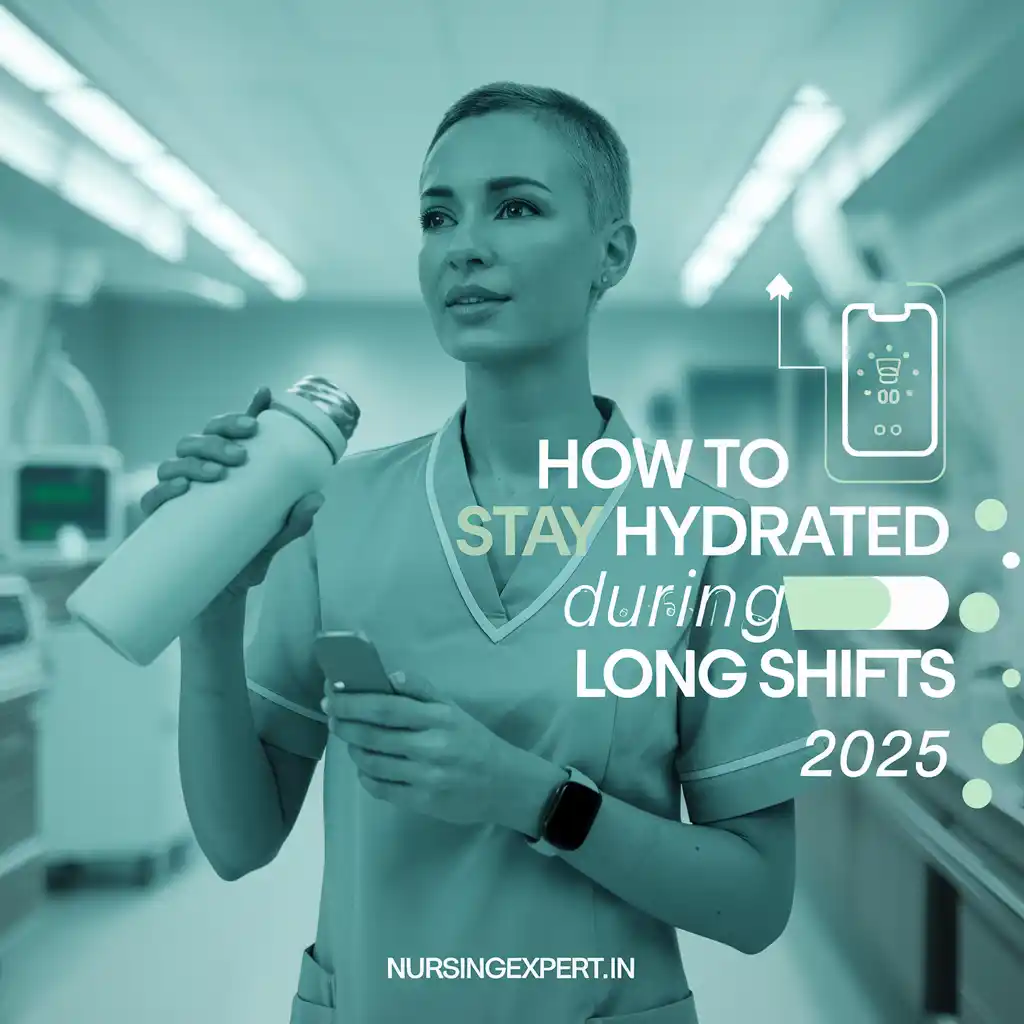In the demanding world of healthcare, nurses routinely work long shifts that can challenge their physical and mental endurance. Proper hydration is essential for sustaining energy, cognitive function, and overall well-being. In 2025, staying hydrated during extended shifts is not only a matter of personal health but also a key factor in delivering high-quality patient care. This article explores why hydration is critical for nurses, provides practical strategies to maintain fluid balance throughout long shifts, and outlines future trends in hydration management in healthcare settings.
Thank you for reading this post, don't forget to subscribe!
Introduction
Nurses are the cornerstone of healthcare, often working long hours while performing physically and emotionally demanding tasks. Extended shifts, high-stress situations, and rapid patient turnover can all contribute to dehydration—a condition that not only diminishes energy levels and cognitive function but also increases the risk of errors, fatigue, and long-term health complications.


In 2025, increasing awareness of wellness and self-care in the healthcare industry has brought hydration to the forefront of nurse well-being. Hydration is a fundamental aspect of personal health and professional performance; when nurses stay properly hydrated, they are better equipped to manage their busy schedules, make accurate decisions, and provide compassionate care. This article details effective strategies, tips, and future trends to help nurses maintain optimal hydration during long shifts.
The Importance of Hydration for Nurses
a. Physical Benefits
- Sustained Energy Levels: Proper hydration maintains blood volume and supports circulation, which is critical for energy and stamina during long shifts.
- Enhanced Muscle Function: Water is essential for muscle contraction, and staying hydrated prevents cramps and fatigue, allowing nurses to remain active and agile.
- Reduced Risk of Heat Stress: In busy clinical environments, dehydration can lead to heat stress and related conditions. Adequate fluid intake helps regulate body temperature and prevents overheating.
b. Cognitive Benefits
- Improved Concentration: Dehydration can impair cognitive function, resulting in slower reaction times and decreased decision-making abilities. Hydrated nurses are more alert and focused.
- Better Memory Retention: Proper hydration contributes to optimal brain function, enhancing memory and the ability to process complex information.
- Stress Management: Maintaining fluid balance helps stabilize mood and reduce symptoms of anxiety and irritability, which are common during long shifts.
c. Overall Well-Being
- Preventing Chronic Health Issues: Regular hydration is key to preventing issues such as urinary tract infections, kidney stones, and other complications.
- Boosting Immune Function: Adequate water intake supports the immune system, making it easier to fend off infections.
- Enhanced Recovery: A well-hydrated body recovers faster from physical exertion and stress, contributing to long-term health and vitality.
Strategies for Staying Hydrated During Long Shifts
a. Establish a Hydration Plan
i. Set Clear Hydration Goals:
- Daily Fluid Intake: Determine a specific amount of water to drink each day based on personal factors such as body weight, activity levels, and environmental conditions.
- Break-Down Targets: Divide the total daily goal into smaller, manageable amounts to be consumed each hour. For example, if your goal is 2 liters per day during a 12-hour shift, aim for around 166 ml every hour.
ii. Use Digital Tools:
- Hydration Apps: Use mobile applications that track your water intake and provide reminders to drink throughout the day.
- Smart Bottles: Consider investing in a smart water bottle that tracks fluid consumption and integrates with your smartphone to help you meet your hydration goals.
b. Make Water Accessible and Enjoyable
i. Keep a Reusable Water Bottle Handy:
- Portable Bottles: Always have a water bottle within reach. Choose one with measurement markers to track your intake.
- Personalize Your Bottle: Customize your bottle with motivational messages or your favorite colors to encourage regular use.
ii. Enhance the Taste of Water:
- Natural Flavors: Infuse water with slices of fruits (like lemon, lime, or berries), herbs (such as mint or basil), or cucumber for a refreshing taste without added sugar.
- Temperature Preferences: Experiment with iced versus warm water to determine which you prefer during busy shifts.
c. Integrate Hydration into Daily Routines
i. Schedule Hydration Breaks:
- Set Reminders: Use your phone or smartwatch to set regular reminders to take a hydration break during your shift.
- Team-Based Hydration: Encourage colleagues to join you for hydration breaks, which not only improves fluid intake but also fosters camaraderie.
ii. Combine Hydration with Other Self-Care Practices:
- Stretch and Hydrate: Use break times for brief stretching or walking while drinking water to boost circulation and energy.
- Mindful Drinking: Make hydration a mindful practice. Focus on the experience of drinking water—notice its temperature, taste, and the feeling of refreshment—as a moment to reset and recharge.
d. Leverage Technology for Hydration Tracking
i. Digital Health Tools:
- Health Tracking Apps: Integrate apps that monitor your activity, sleep, and overall well-being along with hydration levels to provide a comprehensive picture of your health.
- Wearable Devices: Utilize wearables that remind you to drink water based on your activity level and environmental conditions.
e. Create a Supportive Workplace Environment
i. Advocate for Accessible Hydration:
- Water Stations: Work with your institution to ensure that there are accessible water stations in high-traffic areas, such as nurse break rooms, near nursing stations, and throughout the hospital.
- Organizational Policies: Encourage the implementation of wellness programs and policies that emphasize regular hydration and overall self-care for staff.
ii. Peer Support and Team Culture:
- Encourage Group Activities: Foster an environment where team members support each other by sharing hydration goals, challenges, and successes.
- Wellness Challenges: Organize friendly hydration competitions or challenges within your department to promote consistent fluid intake among colleagues.
Addressing Challenges in Staying Hydrated
a. Time Constraints
- Integrate into Routine: Incorporate hydration into daily tasks by keeping water easily accessible and using digital reminders.
- Efficient Practices: Even brief sips throughout the day can add up. Focus on making hydration a habit rather than attempting to drink large amounts at once.
b. Physical Barriers
- Mobility and Access: For nurses with physical limitations or those who work in physically demanding roles, choose ergonomic, portable water bottles and ensure water is available at every station.
- Fatigue and Overwhelm: Recognize that fatigue can lead to forgetting to hydrate. Use technology to help mitigate this, ensuring that reminders are set and are hard to ignore during busy shifts.
c. Environmental Factors
- Temperature: Adjust water intake based on the climate and work environment. In warmer or more physically demanding settings, increase fluid consumption accordingly.
- Shift Variability: Tailor your hydration strategy to different shift patterns. Night shifts, for instance, may require adjustments in timing to align with circadian rhythms.
Future Trends in Hydration Management for Nurses
a. Integration of Advanced Wearable Technology
- Smart Hydration Monitors: Expect next-generation wearable devices that provide real-time hydration data and personalized intake recommendations based on activity levels and environmental conditions.
- Wearable Alerts: Devices may use biometric indicators to send personalized alerts for hydration, helping nurses to maintain consistent fluid intake.
b. AI and Digital Health Innovations
- Predictive Analytics: AI-driven platforms will analyze real-time data to predict dehydration risks and offer proactive intervention suggestions.
- Personalized Health Platforms: Digital ecosystems that integrate hydration tracking with overall wellness monitoring will become standard, enabling nurses to manage their health holistically.
c. Enhanced Workplace Wellness Programs
- Institutional Support: Healthcare organizations will increasingly invest in comprehensive wellness programs that emphasize hydration along with other self-care practices.
- Policy Integration: Policies supporting mandatory wellness breaks, accessible hydration stations, and employee self-care will likely be more common, reflecting a broader commitment to staff well-being.
d. Global and Interprofessional Collaboration
- Best Practices Sharing: Digital platforms will facilitate the sharing of best practices for hydration and overall wellness across healthcare institutions globally.
- Interdisciplinary Wellness: Collaboration between nurses, dietitians, occupational therapists, and IT professionals will lead to integrated approaches that further enhance hydration strategies.
Frequently Asked Questions (FAQs)
Q1: Why is hydration important for nurses during long shifts?
A: Hydration is critical for maintaining energy, concentration, and overall physical health. Proper fluid intake helps prevent fatigue, muscle cramps, and cognitive impairment—key factors in ensuring that nurses can perform at their best.
Q2: What are some effective strategies for staying hydrated during a long shift?
A: Effective strategies include carrying a reusable water bottle, scheduling regular hydration breaks using digital reminders, infusing water with natural flavors for variety, and integrating water intake with mindfulness practices.
Q3: How can digital tools assist with hydration management?
A: Mobile apps and wearable devices can monitor fluid intake, set personalized reminders, track activity levels, and provide insights into hydration status—all of which help nurses manage their fluid balance more effectively.
Q4: What challenges might nurses face in maintaining hydration, and how can they overcome them?
A: Challenges include time constraints, heavy workloads, and physical exhaustion. Overcoming these involves integrating hydration into daily routines, utilizing digital reminders, and advocating for accessible water sources in the workplace.
Q5: How does the workplace environment affect hydration?
A: A supportive workplace with accessible water stations, wellness policies, and a culture that encourages self-care makes it easier for nurses to stay hydrated. Organizational support plays a critical role in managing hydration effectively.
Q6: Are there any future trends in hydration management for nurses?
A: Future trends include the adoption of advanced wearable devices, AI-driven personalized hydration recommendations, enhanced digital health platforms, and stronger organizational policies supporting continuous hydration practices.
Q7: How can I create a personalized hydration plan?
A: Determine your individual fluid needs based on activity level, body weight, and environmental conditions. Set specific, measurable hydration goals, use digital tools to track your progress, and adjust your plan as necessary to ensure you remain consistently hydrated throughout your shift.
Conclusion
Maintaining proper hydration is essential for nurses to sustain energy, focus, and overall well-being during long shifts. In 2025, leveraging digital tools, establishing personalized hydration routines, and fostering a supportive workplace culture are key to overcoming the challenges of high workloads and environmental pressures. By integrating these strategies, nurses can not only enhance their own health and performance but also contribute to improved patient care and a healthier work environment.
As the healthcare landscape continues to evolve, so too will the technologies and organizational policies that support nurse wellness. Embracing a proactive, technology-driven approach to hydration management will be essential for thriving in demanding clinical settings. With a commitment to self-care and continuous improvement, nurses can ensure they remain resilient and ready to meet the challenges of the modern healthcare environment.
References and Sources
- American Nurses Association (ANA). (2023). Nurse Well-Being and Self-Care Strategies. Retrieved from https://www.nursingworld.org
- Centers for Disease Control and Prevention (CDC). (2024). Hydration and Health Guidelines. Retrieved from https://www.cdc.gov/nutrition
- Journal of Clinical Nursing. (2023). The Impact of Hydration on Nurse Performance. Retrieved from https://journals.lww.com/jcn
- Institute for Healthcare Improvement (IHI). (2022). Employee Wellness in Healthcare. Retrieved from https://www.ihi.org


